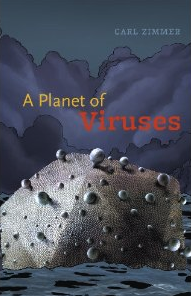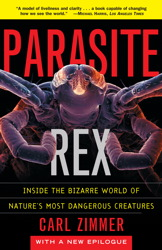Carl Zimmer's Blog, page 66
April 27, 2011
Rabbits with horns: io9 offers an excerpt of A Planet of Viruses
 Over at the science-fiction/science web site io9, you can find an excerpt from A Planet of Viruses. There's a lot about viruses that seems tailor-made for science fiction fans, but I have to say the folks at io9 zeroed in on the sci-fi-est of them all: a virus that can make rabbits grow horns, turn people into trees, and make human cells outlive their owners. Check it out!
Over at the science-fiction/science web site io9, you can find an excerpt from A Planet of Viruses. There's a lot about viruses that seems tailor-made for science fiction fans, but I have to say the folks at io9 zeroed in on the sci-fi-est of them all: a virus that can make rabbits grow horns, turn people into trees, and make human cells outlive their owners. Check it out!

April 26, 2011
Finding your inner time machine: My new column for Discover
 My latest Brain column is now online. I look at the science of time travel. We may not be able to transport ourselves physically into the future or the past as H.G. Wells imagined, but we can travel mentally. And it turns out that we use a lot of the same equipment to go in both directions. In fact, our ability to remember our past may have evolved because it helped us project ourselves into the future. Check it out.
My latest Brain column is now online. I look at the science of time travel. We may not be able to transport ourselves physically into the future or the past as H.G. Wells imagined, but we can travel mentally. And it turns out that we use a lot of the same equipment to go in both directions. In fact, our ability to remember our past may have evolved because it helped us project ourselves into the future. Check it out.
[ Image ]
April 25, 2011
Read an excerpt from "A Planet of Viruses" at Audubon Magazine
 My new book A Planet of Viruses is officially published on May 1. But if you'd like to get a taste of the book, pay a visit to Audubon Magazine's web site, where they've got an excerpt.
My new book A Planet of Viruses is officially published on May 1. But if you'd like to get a taste of the book, pay a visit to Audubon Magazine's web site, where they've got an excerpt.
The book is a linked series of essays. For each essay, I picked a single virus, but I chose ones that allowed me to explore a big idea in the world of virology. In the Audubon excerpt, for example, the virus is West Nile. As viruses go, West Nile is not all that dangerous. But its story is fascinating. West Nile's tale is the classic American immigrant saga, from its arrival in New York City to its eventual spread across the country. Check it out.

April 22, 2011
Arsenic life and all that: My new book review for the Wall Street Journal
 The Wall Street Journal recently asked me to review a new book called First Contact: Scientific Breakthroughs in the Hunt for Life Beyond Earth. Astrobiology is a tricky subject to write about these days. It's intensely exciting, despite the fact that its main object of study–life on other planets–has yet to be discovered.
The Wall Street Journal recently asked me to review a new book called First Contact: Scientific Breakthroughs in the Hunt for Life Beyond Earth. Astrobiology is a tricky subject to write about these days. It's intensely exciting, despite the fact that its main object of study–life on other planets–has yet to be discovered.
I've given some thought to how we journalists should cover such a paradoxical science. We shouldn't dismiss it outright, because astrobiologists have discovered fascinating things about life here on Earth, even if they have yet to find aliens. Yet we shouldn't feel obligated to pump up every claim about the possibility of life elsewhere. We should be content to paint a portrait of the scientific process–including the intense debates–in all its gorey detail.
By this measure, I don't think First Contact works. The author, Marc Kaufman, declares at the outset of the book that "before the end of this century, and perhaps much sooner than that, scientists will determine that life exists elsewhere in the universe." Not whether life exists, mind you, but that it exists.
I don't think he backed up that bold claim. Instead, he ...

It was just a matter of time: LOL Parasites
Thanks to Joe DeCapo for his response to my offer of an autographed book plate for the new edition of Parasite Rex. And yes, his cat (named μ) does probably haz one.


April 20, 2011
Blood type, meet bug type: my new story for the New York Times
 For some time now I've been bewitched by the microbiome–those 100 trillion passengers that make our bodies their vessel (here's a piece from the New York Times last year, and a long essay from last month). But I was especially intrigued by a paper that came out today in Nature. Scientists found they could sort people into just three distinct gut microbiomes, much like they can sort people into four blood types. Here's my story in the Times, which will appear in tomorrow's edition.
For some time now I've been bewitched by the microbiome–those 100 trillion passengers that make our bodies their vessel (here's a piece from the New York Times last year, and a long essay from last month). But I was especially intrigued by a paper that came out today in Nature. Scientists found they could sort people into just three distinct gut microbiomes, much like they can sort people into four blood types. Here's my story in the Times, which will appear in tomorrow's edition.
One thing that you won't find in the article is some intriguing speculation I indulged in with the scientists I interviewed. Researchers have clearly demonstrated that microbes can influence their host's behavior. They release molecules in the gut that travel into the blood and then into the brain. The bacteria that live in obese mice can make ordinary mice voracious. My fellow Discover blogger Ed Yong has written about how the microbiome can steer the development of mice to become more or less anxious as adults. In an upcoming review called "The Mind-Body-Microbial Continuum," a team of microbiome experts ponder how our microbes might play ...

April 19, 2011
A Planet of Viruses: "Absolutely top drawer" says Booklist
 The reviews are just starting to come out for A Planet of Viruses–here's a starred one slated to appear soon in Booklist:
The reviews are just starting to come out for A Planet of Viruses–here's a starred one slated to appear soon in Booklist:
The effects of viruses have been known since time immemorial, thanks to the common cold, the flu, and smallpox. But when viruses were physically discovered in the late nineteenth century, it was by elimination; that is, something was discovered that caused disease but wasn't animal, plant, fungus, or bacterium. The electron microscope finally made that something visible, and its basic mechanisms were ascertained by 1950. What has been discovered about viruses since, however, dwarfs all that previous virological knowledge. For viruses are everywhere, and a recurring motif of Zimmer's information- packed, superbly readable, brief essays is the assay of a substance—seawater, human sputum, subterranean warm water segregated for hundreds of thousands of years from the biology of the rest of the world—thought to be relatively or positively pure finds it crawling with viruses. Obviously, not all viruses kill or even sicken. In fact, it's not so much a matter of perforce having to live with viruses as not being able to live without them, and not ...
Warming up, turning sour, losing breath
 We like to think about risks with simple arrows. If A, then B. If wildfires break out, some people may lose their homes. If an oil pipeline leaks, it can pollute the soil. But if you put a wildfire and an oil pipeline leak together in the same place at the same time, the whole becomes a lot nastier than sum of its parts.
We like to think about risks with simple arrows. If A, then B. If wildfires break out, some people may lose their homes. If an oil pipeline leaks, it can pollute the soil. But if you put a wildfire and an oil pipeline leak together in the same place at the same time, the whole becomes a lot nastier than sum of its parts.
The world's oceans face three different major risks from the carbon that we put in the air. That extra carbon (9.2 billion tons in 2009 alone) is acidifying the ocean, warming it, and possibly even stripping it of oxygen. I've written about all three of carbon's impacts in recent years, but I've chosen to write about them independently. That's standard practice in journalism: you select one narrowly defined topic and explore it as deeply as you can in the space you've got. But these three impacts are all hitting the same ocean all at once, and they're interacting with each other as they do. In a new paper in the Philosophical Transactions of the Royal Society, the environmental scientist Nicolas Gruber warns ...
April 14, 2011
Celebrating a decade under the influence of parasites: My talk tomorrow (4/15) at SUNY Plattsburgh
 I'll be speaking tomorrow at SUNY Plattsburgh on the occasion of the publication of the new edition of Parasite Rex. I'll be talking about the many ways in which parasites have infiltrated my mind since the book first came out a decade ago. I hope some Loominaries will be able to attend, and be infiltrated as well.
I'll be speaking tomorrow at SUNY Plattsburgh on the occasion of the publication of the new edition of Parasite Rex. I'll be talking about the many ways in which parasites have infiltrated my mind since the book first came out a decade ago. I hope some Loominaries will be able to attend, and be infiltrated as well.
Where: SUNY Plattburgh, Plattsburgh NY. Room 206, Yokum Hall. (Directions and campus map)
When: Friday, April 15, 12:15 pm.
More details here.

"Blogger" is not synonymous with "angry child"–An interview on the Consilience podcast
An interview with me is running on the latest episode of "Consilience," a podcast on science and skepticism out of South Africa. The conversation, which takes up the second half of the podcast, covers lots of ground. We talked about my new book, A Planet of Viruses, the secret weapons whales use for fighting cancer, and the enduring, tiresome mistake people make of thinking of bloggers as angry children. Check it out.


















